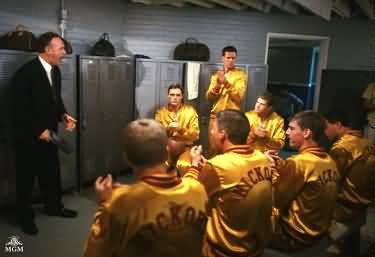Basketball Coaching - How to Motivate Your Team Throughout the Season - by Austin Winder
From the Coach’s Clipboard Basketball Playbook"Helping coaches coach better..."
Austin Winder is a Public Relations Specialist and contributing author for Rhino Rugby. He lives in Memphis, TN and graduated with a business and marketing degree from the University of Memphis.
Motivation is a tricky thing in sports. At the start of a season, for example, motivation is easy; every team starts on the same footing and optimism is at an all-time high. As the season progresses, however, adversity sets in. Whether it's a nagging injury, a losing streak, or personal issues arising between teammates, that early motivation can slowly dissipate.
That's why it's crucial to help your team to remain motivated throughout the season. It's one of the most difficult jobs for a coach as well, since each person is motivated by different things. No matter what clicks with your players, these tips will help you to establish a connection that helps you to keep your players excited and striving for greatness.

"Hoosiers"
Two-way communication
Don't just give the players instructions - listen to their individual needs. Understanding what each player needs encourages them that they're being heard. This is an essential part of keeping an engaged relationship with your team. This positivity will soon transfer and the team members will then spread the same energy among themselves. Try gathering and encouraging feedback with the players. Once that has been communicated, act on it. This will increase productivity and enhance collaboration.
Keep practices exciting and make them count
Doing the same thing on a daily basis will only set them up to think of the practice as predictable and boring. This will decrease productivity and demotivate them from pushing harder to achieve the goal. Keep your team working hard - the more in shape they are and well practiced, the more confident they will be to be motivated.
Encouragement
This might seem like an obvious one but complimenting your team on their success and giving them positive reinforcement goes a long way. Take an extra step to really analyze and observe their progression before complimenting. Instead of saying "nice work", give them a compliment on something specific such as the way they made a great pass, worked well in communicating with the other players, etc. Specification seems more genuine and warm-hearted than generic compliments.
Motivation Through Incentives
Incentives are an effective way to motivate. This is also known as the "dangling the carrot" method and allows the athlete to focus on the prize at the end of the road. Come up with interesting incentives that will be beneficial to the team in the long run. For example, reward them with a free dinner or the day off if they get a win or reach their goals. Goal setting is one of the main ways to motivate and having an eye on the prize at the end of the struggle is a great way to keep your team's mind focused on something other than the difficulty.
Get input from your athletes
And make sure that they know they are heard. Let their influence matter so they feel more connected to the team and their goals. When people are connected, they become more empathetic and caring towards one another. If they aren't connected, they won't be encouraging. When you make it known to them that you're hearing them as well, they will instill trust in you and work harder to make you proud of their work in the game.
Create an environment that gives your team recognition and appreciation
Keeping a positive vibe will instill bliss and happiness in your team and the environment. Don't take things too seriously or be too harsh when something doesn't go as planned. If you do, the players won't really be too amped up to come to the games or practice. Even worse, they will be fearful of how you will react if they can't perform well one day.
Be the role model you want your team to emulate
The best coach leads by example. Be the standard of hard work, ethics, and motivation you want to see from your team. Because you are older with more experience and knowledge, they will look up to you and emulate your character in certain ways. If you're not emitting positive energy in the game, they will catch on and perform under their standards.